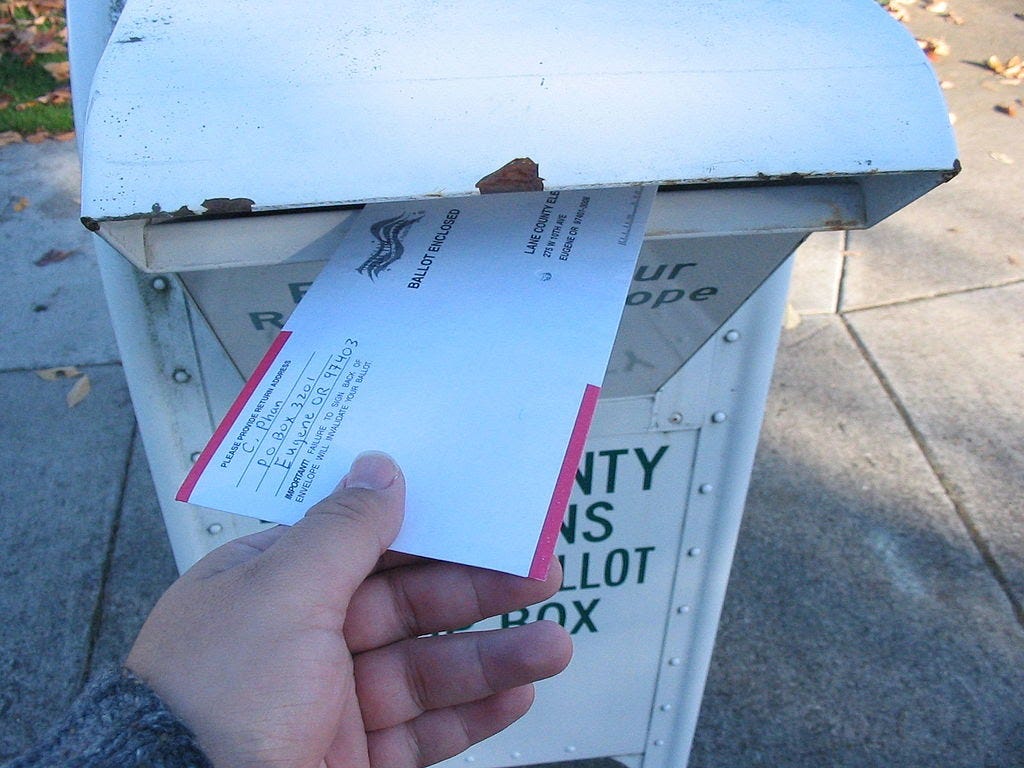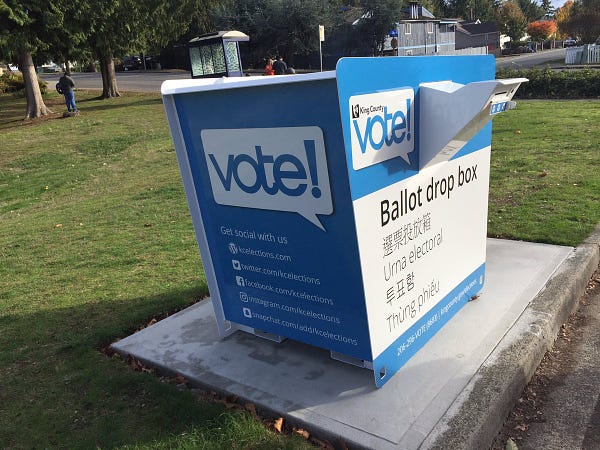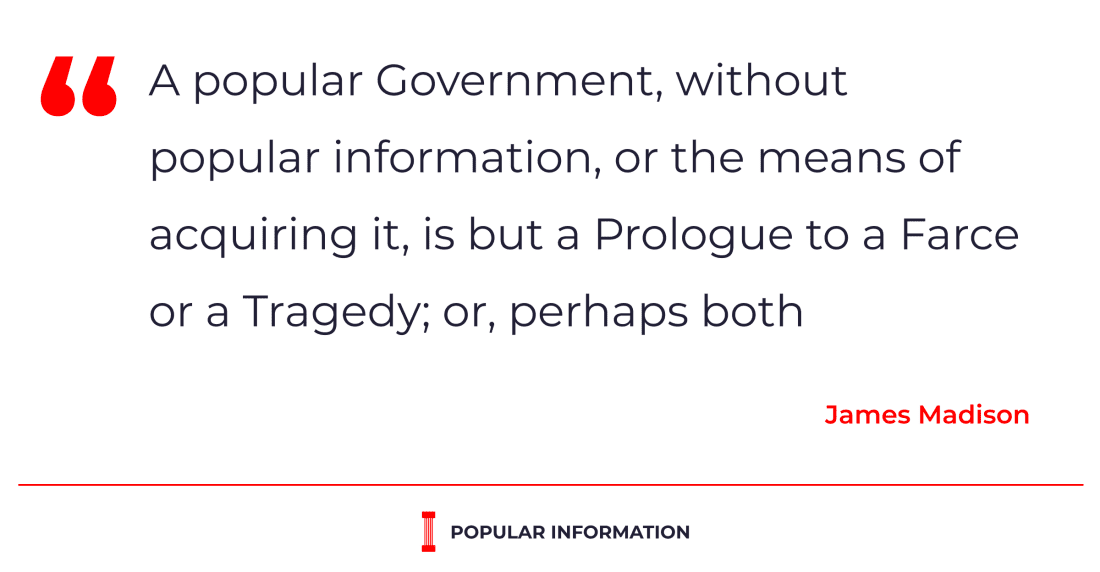
The COVID-19 pandemic threatens the ability of millions of Americans to cast their ballots safely in November's general election. The virus has already delayed primary elections in 20 states.
Hopefully, the pandemic will peak in the United States later this spring. But even in that scenario, there could be a second wave of COVID-19 infections in the fall. A severe outbreak could make in-person voting extremely dangerous. Regardless, the threat of new infections will linger until there is a vaccine, which reportedly won't be available until 2021.
There are 217 days until election day. That's enough time to ensure that everyone — including the elderly and the immunocompromised — don't have to choose between protecting their health and participating in the democratic process. It can be accomplished through a federal law that guarantees the right to vote-by-mail.
Can vote-by-mail work? Yes, because it is already working.
Oregon has been conducting elections almost exclusively by mail since 2000 without issues. Vote-by-mail is also available in every election in Hawaii, Oregon, Utah, and Washington state. There are "21 other states have laws that allow certain smaller elections, such as school board contests, to be conducted by mail."
But COVID-19 is a nationwide issue, and there needs to be a nationwide solution to protect the integrity of the 2020 election.
How would nationwide vote-by-mail work?
The Brennen Center, a non-profit dedicated to the democratic process, has created a framework for nationwide voting by mail. First, it would not replace in-person voting. The option for in-person voting would be maintained for people who "do not wish to, do not know how to, do not have access to, or cannot use mail voting." But by offering vote-by-mail to all Americans, it would make polling places less crowded and safer for those that do show up on election day. The Brennen Center also recommends shifting polling places from senior centers and other locations that serve people at high risk from COVID-19.
One option is to simply mail a ballot to every registered voter. The Brennen Center recommends that for states like Oregon, which already has the infrastructure in place. For other states, voters could request mail-in ballots "online, in person, by phone, and by mail." In addition to mailing in their ballots, voters could return ballots via secure "drop boxes" or "secure curbside drop-off options at polling places." Here's an example of what one of those drop boxes looks like from a recent election in Washington state:


There should be a "uniform processes for evaluating the validity of mail ballots should be implemented to prevent widespread disenfranchisement as a result of an uptick in mail ballots," according to the Brennen Center's recommendations. The process should ensure ballots are not "rejected based on technical defects that do not substantially relate to ensuring that the ballot was actually completed and cast by the voter."
Finally, there also needs to be money allocated "to expand capacity to process a surge in the number of mail ballots, including purchasing high-speed ballot scanners and automated mail sorting systems, securing additional warehouse space to store the additional equipment and supplies needed for mail balloting, and increasing election staff to process mail ballots and ballot applications." The last coronavirus bill provided $400 million to help states with the 2020 election. More funding would be needed, however, to make vote-by-mail available nationwide.
Is vote-by-mail vulnerable to fraud and manipulation?
Any voting system has risk, and mail-in voting is no exception. This newsletter extensively covered how North Carolina Republicans manipulated mail-in absentee ballots during the 2018 elections.
But Phil Keisling, who designed Oregon's system during his tenure as Secretary of State in the 1990s, argues that the risks of significant fraud in mail-based voting are lower than other systems, particularly electronic voting.
But there’s an even stronger argument for dispensing with the fraud bogeyman. Mail-based voting systems today are far less risky than most polling place elections, precisely because they distribute ballots (and electoral risk) in such a decentralized way. To have any reasonable chance of success, an organized effort to defraud a mail-based system and its safeguards must involve hundreds (if not thousands) of separate acts, all of them individual felonies, that must both occur and go undetected to have any chance of success.
Contrast that to the risks inherent in polling place elections that increasingly rely on direct-recording electronic (DRE) voting systems and proprietary software systems that both record and tally votes. A single successful software hack potentially could affect thousands of votes. It’s the difference between “retail” fraud and “wholesale” fraud.
In 20 years, Oregon has had no significant allegations of fraud, despite several close contests — including a 2004 gubernatorial election that was decided by 129 votes.
Who opposes vote-by-mail?
On March 23, House Democrats proposed an emergency coronavirus bill. That bill, which did not become law, included "a national requirement for both 15 days of early voting and no-excuse absentee vote-by-mail, including mailing a ballot to all registered voters in an emergency."
Appearing on Fox News this morning, Trump said the voting provisions of the House bill would mean "you'd never have a Republican elected in this country again."


Trump was saying something that many Republicans believe, but few acknowledge publicly: Republicans do better when it's harder to vote. That's why many Republicans support voter ID requirements, registration purges, and the disenfranchisement of felons.
In a conference call last week, Senator Chris Coons (D-DE) said he believed Senate Majority Leader Mitch McConnell also opposed expanding vote-by-mail.
“I see no evidence that Majority Leader McConnell has weakened his opposition,” said Sen. Chris Coons (D-Del.) on Monday, highlighting the Kentucky Republican’s past and continuing role as an ardent opponent of federal election legislation efforts. “To be really blunt, that’s partly because voter suppression efforts in a number of states around the country include things like changing the hours, changing the location of polling precincts—and vote-by-mail is a way to work around that or to weaken that as a voter suppression tool.”
In this case, however, Trump and McConnell may be shooting themselves in the foot. Older Americans, who are the most vulnerable to COVID-19, represent Trump's strongest base of support. If Florida voters over 65, for example, don't feel comfortable heading to the polls in November, that could be catastrophic for Trump.
In the absence of federal legislation, however, individual states could still expand vote-by-mail.
Thanks for reading!



My mother doesn’t believe the virus’ spread is Trump’s fault or that he could have done anything differently. She lives in the middle of trump country. It’s all ‘China’s fault’ there. I mention this because even in the face of a world-wide pandemic, one that could have been mitigated & managed better on so many levels, people are *STILL* blinded to the evil of Trump & Republicans. A Republican could walk up and snatch the ballot directly out of their hands & they’d blame someone else. An “illegal” or a “felon” or “voter fraud”... it’s always “their” fault.
Do you sleep? I’ve just submitted my last essay to my professor. It was only 800 words and took me a week and half to finish. Your reporting is phenomenal. I appreciate and read all of your articles. You are able to clearly present hard facts so we can understand them.